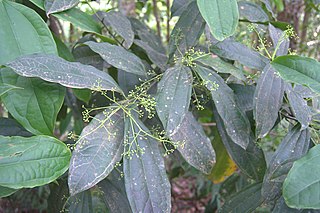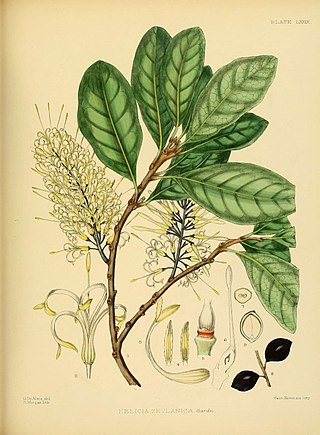
Heritiera longipetiolata is a species of flowering plant in the family Malvaceae. It is found in Guam, Northern Mariana Islands, and possibly Micronesia. It is threatened by habitat loss.
Clusia longipetiolata is a species of flowering plant in the family Clusiaceae. It is found only in Panama. It is threatened by habitat loss.

The gray snub-nosed monkey, also known as Brelich's snub-nosed monkey, Guizhou snub-nosed monkey, and Guizhou golden monkey, is a species of primate in the family Cercopithecidae. It is endemic to China, where it is known as the Guizhou golden hair monkey (黔金丝猴) or gray golden hair monkey (灰金丝猴). It is threatened by habitat loss. Of the three species of snub-nosed monkeys in China, the gray snub-nosed monkey is the most threatened, with a total population thought to number fewer than 400 individuals.

Aiouea is a genus of shrubs and trees in the family Lauraceae. It is native to tropical forests and montane forests of North and South America. The name is a curiosity because it consists entirely of vowels.

Fagus longipetiolata is a beech tree species in the family Fagaceae. It is a tree up to 25 metres (82 ft) tall found in southern and eastern China and in Vietnam.

Helicia is a genus of 110 species of trees and shrubs, constituting part of the plant family Proteaceae. They grow naturally in rainforests throughout tropical South and Southeast Asia, including India, Sri Lanka, Indochina, Peninsular Malaysia to New Guinea and as far south as New South Wales.
Melanochyla longipetiolata is a species of plant in the family Anacardiaceae. It is a tree endemic to Peninsular Malaysia. It is threatened by habitat loss.
Myristica longipetiolata is a species of plant in the family Myristicaceae. It is endemic to the Philippines.
Damburneya bicolor is a species of plant in the family Lauraceae. It is endemic to Panama. It is threatened by habitat loss.
Damburneya cufodontisii is a species of plant in the family Lauraceae. It is found in Costa Rica, Nicaragua, and Panama.
Damburneya leucocome is a species of plant in the family Lauraceae. It is endemic to Chiapas state in southwestern Mexico.
Damburneya matudae is a species of plant in the family Lauraceae.
Damburneya mirafloris is a species of plant in the family Lauraceae. It is endemic to Nicaragua.
Damburneya rudis is a species of plant in the family Lauraceae. It is found in El Salvador, Guatemala, and the Mexican state of Chiapas.
Damburneya salicina is a species of plant in the family Lauraceae. It is found in Costa Rica and Panama.
Damburneya smithii is a species of plant in the family Lauraceae. It is found in Costa Rica and Panama.
Damburneya roberto-andinoi is a species of plant in the family Lauraceae. It is endemic to Honduras. It is a tree growing up to 15 meters tall.
Psychotria longipetiolata is a species of plant in the family Rubiaceae. It is endemic to Sri Lanka.
Damburneya guatemalensis is a plant species in the family Lauraceae. It is endemic to Guatemala where it has only been found in the departments of Petén, Alta Verapaz and Izabal. It is a tree or shrub of up to 8 m that grows in tall broadleaf forest in association with Orbignya species.

Damburneya is a genus of evergreen trees and shrubs in the laurel family (Lauraceae). It is native to tropical regions of North America and South America, with the center of diversity in Central America.






